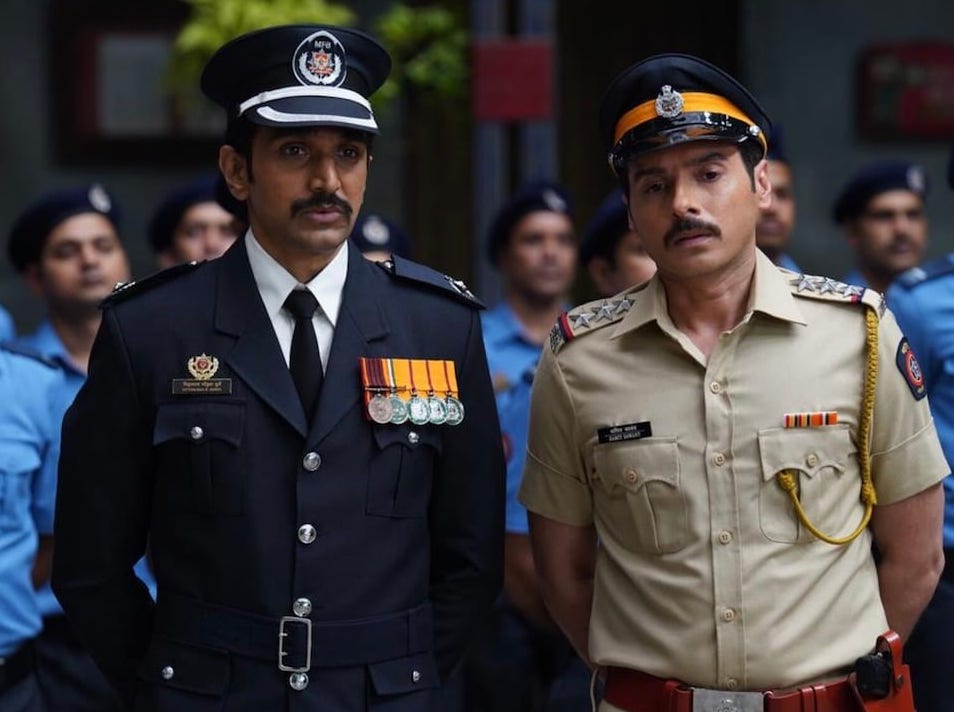Rahul Dholakia’s Agni, now streaming on Prime Video, attempts to capture Mumbai’s firefighters’ relentless challenges. They tirelessly safeguard the city while their efforts often go unnoticed. Though the film tries to be as accurate as possible, the ineffective storytelling and desperately forced attempts to heighten the drama make for rather disappointing viewing.
Vitthalrao Surve (Pratik Gandhi) is a committed firefighter working at a fire station in Parel, Mumbai. He lives in the firefighter’s staff quarters with his wife, Rukmini (Sai Tamhankar), and their son, Amar (Kabir Shah). His brother-in-law, Samit (Divyenndu), a corrupt police officer, leads a life of luxury. Vitthalrao and Samit are always at loggerheads over their principles and choices in life. As fire incidents in the city escalate, Vitthalrao begins to suspect arson. Meanwhile, Avni (Saiyami Kher), an officer on his team, discovers a pattern in the cases. At the same time, Samit comes across a murder case with links to a suspect involved in the crimes…
First off, Agni deserves some applause for highlighting the plight of Mumbai’s firefighters without being preachy. Scenes like a wife performing rituals to ward off the evil eye after her husband has returned home or a jovial gathering between firefighters during lunch that gets disrupted by the announcement of a fire are some of the gentle moments in the film that capture both human interest and personal drama and highlight the danger prevalent in their lives. The film also addresses the deep-seated corruption in our society, where fire hazard concerns are treated as tertiary. Builders prioritize constructing one building after another over ensuring the well-being and security of citizens.
Unfortunately, for all its good intentions, the film remains surprisingly tame and ultimately feels underwhelming. The screenplay, written by Dholakia, feels like an assortment of scenes that never quite come together cohesively. There are moments where the emotional tone could have reached a crescendo, but the tight control in both the writing and direction are missing. As the film progresses, the story falters more and more and the characters become less and less engaging with each passing moment. The staging of scenes feels insufficiently executed. The tension between Vitthalrao and Samit never feels natural while Vitthalrao’s growing distance from his son lacks the depth it deserves. Even the twist revealing the arsonist midway through fails to evoke the impact it should and the climax of the film feels like a cheap imitation of Hollywood survival dramas from the ’90s, offering us a payoff that is a big letdown.
The actors try gamely to rise above the script. Pratik Gandhi is suitably restrained and respectful in his role as Vitthalrao. As a devoted husband and loving father, he brings heartfelt warmth to his character, balancing his heroic duty with his grace and depth. Divyenndu brings a humorous swagger to the corrupt Samit that is both assertive and compelling. While driven by greed for wealth, he still knows how to fulfil his duty as a protector of the law. Jitendra Joshi portrays a dedicated firefighter with a character arc marked by a complex blend of grief and revenge, taking an unforeseen trajectory. Saiyami Kher and Sai Tamhankar possess a strong sense of agency that is effectively conveyed through their performances.
KU Mohanan’s cinematography effectively conveys the shifting inner psyche of the characters, creating a sense of foreboding. From the burning interiors of the building to the lingering sense of foreboding among the rescuers, his visuals effectively evoke both tension and intensity. Satheesh PM’s brilliant sound design brings alive the fire bells the crackling of fire and the destruction of massive structures. John Stewart Eduri’s background score complements the tone of the scenes, whether tense or emotional. However, Deepa Bhatia’s editing struggles to bring coherence to the juggled and fragmented screenplay.
Agni stands out due to its attention to detail and unique setting. But it fails to capitalize on its strengths and despite the ardor of the action, it leaves one with a sense of dissatisfaction and dismay at what could have been rather than what is.
Hindi, Action, Drama, Color


